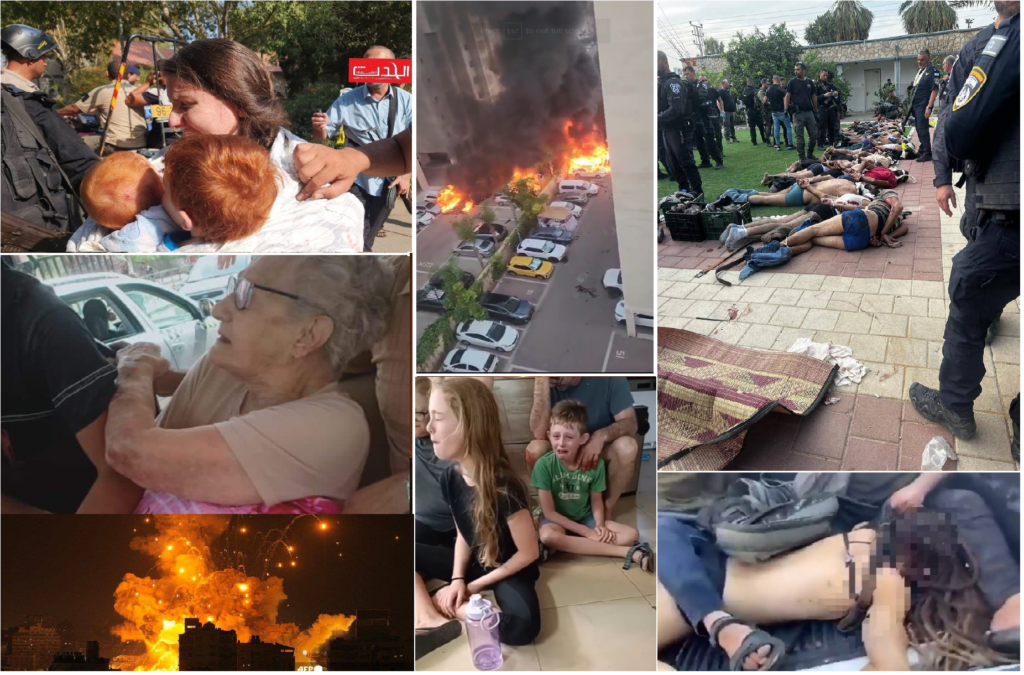
- The sheer size of this well-planned Hamas offensive, which seems to have been prepared over months, raises concerns about the possible collaboration with Iran-backed Hezbollah fighters.
- The very foundation of the Saudi Arabia-Israel normalization agreement appears to be hanging by a thread due to the unprecedented turn of events.
- The further destabilization of the Middle East could lead to a sharp increase in crude oil prices and cast a menacing shadow over the already fragile global economy.
In an astonishing and alarming turn of events, the Palestinian Islamic terror group Hamas carried out a completely unexpected attack on Israel. This bold action involved launching an enormous barrage of more than 5,000 rockets from the Gaza Strip, causing widespread destruction in Israeli cities. To make matters worse, heavily armed gunmen infiltrated southern Israel, brutally attacking Israeli soldiers and civilians right in their own neighbourhoods. The scale of this attack sent shockwaves throughout the region, and people around the world are watching in horror as this unprecedented crisis continues to develop.
The Jehadis, driven by their extreme hatred for Jews, heartlessly attacked innocent civilians. They even took women, children and aged as hostages and attacked homes. This left behind a terrible scene of destruction and loss. The number of casualties has gone beyond 300. The situation in the region is tense, and there are concerns that it could get even worse in the coming days. Hamas has claimed that they have captured several Israelis and are holding them in underground tunnels.
Isreal Retaliates
In a strong response to Hamas’ daring “Operation Al Aqsa Floods,” Israel initiated a forceful operation called “Swords of Iron.” This led to Israeli Prime Minister Benjamin Netanyahu declaring that the nation was now in a full-blown war. The Chief of General Staff called for the mobilization of 80,000 reserve forces, quickly sending them to the unstable areas around the besieged Gaza Strip. Their primary mission is to protect the residents of southern Israel who are facing danger.
Israeli IDF fighter jets were very active in attacking the extremist Jehadi Hamas group in the troubled Gaza Strip. It was a relentless effort to hit their targets.
Energy Minister Yisrael Katz instructed the Israel Electric Corporation to stop providing electricity to the struggling Gaza Strip, which will leave it in darkness. The Israel Defense Minister has promised that they are determined to bring significant changes in Gaza, and this casts a long shadow over the region’s prospects for the next fifty years. Danny Kenon, a member of the Israeli Knesset, acknowledges that the people of Gaza will face tough nights ahead.
As tensions rise, the Northern Command of the Israeli Defense Forces is preparing for a potentially catastrophic confrontation with the powerful Hezbollah. This situation has the potential to bring about unprecedented chaos and destruction on both sides.
The Colossal Intelligence Failure
This barbaric attack by Islamic terrorists has hit Israel hard and exposed a major intelligence failure. The Israeli security establishment was caught off guard by the bold infiltration of Hamas terrorists across the once-secure southern border and the relentless rocket attacks, which threatened Tel Aviv and Jerusalem. The sheer size of this well-planned Hamas offensive, which seems to have been prepared over months, raises concerns about possible collaboration with Iranian Hezbollah fighters. This situation is raising troubling questions. What’s even more puzzling is the apparent lack of activity from the renowned Mossad, known for its top-notch intelligence work.
It’s indeed a puzzling question why Israeli security couldn’t anticipate this major threat. Back in May 2021, there was already heightened tension between Hamas and Israel due to issues in East Jerusalem, like Sheikh Jarrah and Al-Aqsa Mosque. During that time, Hamas fired 4,300 rockets, and Israel responded with airstrikes on Gaza. After 11 days of conflict, a ceasefire mediated by Egypt and the UN was finally reached on May 21, 2021, which stopped the immediate fighting.
Geopolitical Impact of the Attack
In the aftermath of this unprecedented event, the very foundation of the Saudi Arabia-Israel normalization agreement appears to be hanging by a thread, its once-promising prospects now in grave jeopardy, endangering the historic pact scheduled for formalization later this year. The international stage is awash with a cacophony of accusations and recriminations as key regional players, including Qatar, Egypt, Turkey, and Pakistan, raise their voices in collective condemnation, pointing their fingers directly at Israel for their perceived role in the unfolding crisis.
This event has taken a particularly heavy toll on the recent Saudi Arabia- Iran detente, casting a shadow over what was heralded as a landmark peace agreement which can further exacerbate regional tensions, raising doubts about the viability of future negotiations.
Similarities to the 26/11 Mumbai attack
The recent attack by Islamic terrorists from Hamas on Israeli citizens brings back haunting memories of a tragic event that unfolded in Mumbai on November 26, 2008. During that horrifying incident, 166 lives were tragically lost, including foreign nationals and more than 300 people were injured. Pakistani-trained terrorists, driven by extreme beliefs, caused unspeakable harm, indiscriminately taking the lives of women, children, and innocent individuals. However, the level of violence unleashed by Hamas in Israel surpasses even the darkest depths of the Mumbai attack.
PM Modi’s support to Isreal
Indian Prime Minister Narendra Modi has strongly denounced the terrible attack on Israel, emphasizing India’s unwavering support during these dark times. This declaration of solidarity has resonated worldwide, showcasing international alliances that are hanging by a thread.
As the tense situation approaches the brink of a potential major geopolitical crisis, the world is anxiously watching, fearing the destabilization of the Middle East, which could lead to a sharp increase in crude oil prices and cast a menacing shadow over the already fragile global economy.
(The author is a post-graduate student in International Relations at Kalinga University, Raipur. Views and opinions expressed are the author’s own)
Aayush Pal is a freelance writer on contemporary geopolitical developments. The views expressed in his work are entirely his own.
